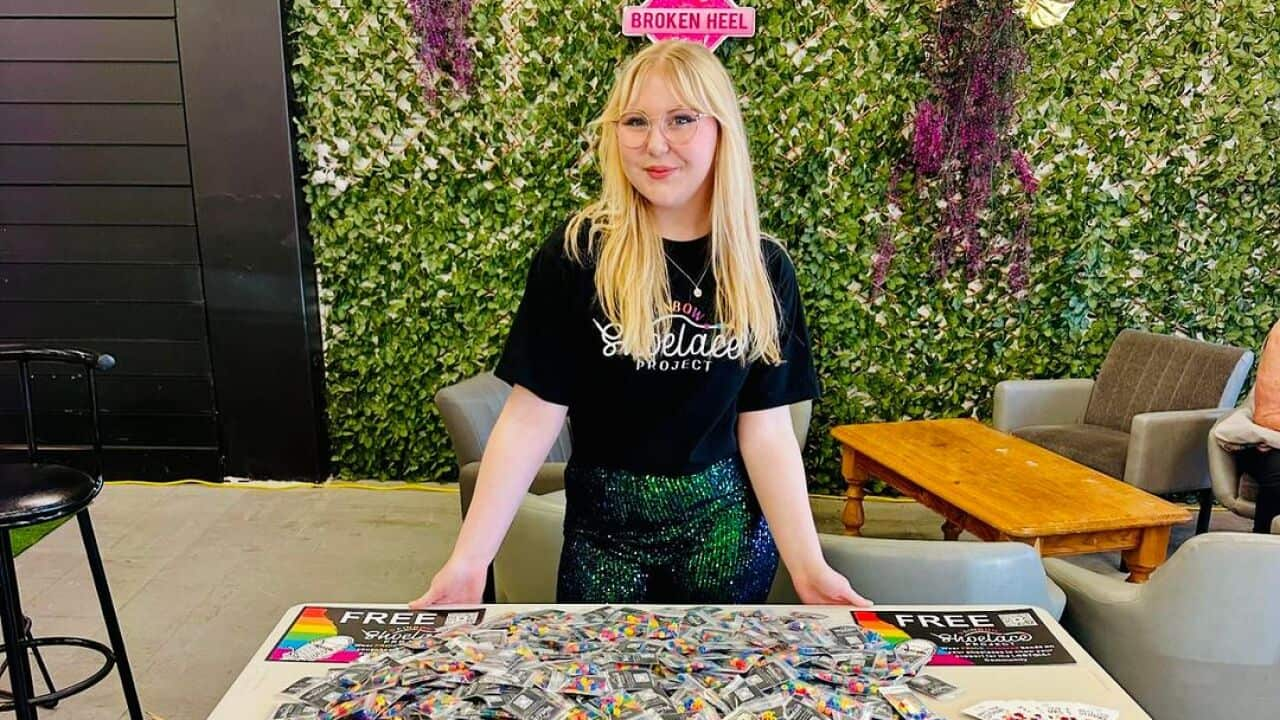This story contains reference to bullying.
As Australia’s social media ban for under-16s made global headlines, 15-year-old Abbie Jane felt a wave of anxiety and frustration wash over her.
A queer teenager from regional NSW, Abbie always felt isolated and misunderstood because of her sexuality. She said finding a supportive community of like-minded people on social media is what keeps her going.
“I was bullied really relentlessly and really horribly at school, face-to-face, for about two years straight,” she told The Feed.
“Social media and the ability to spread positivity and spread my story has basically saved my life.”
Abbie is the founder of the Rainbow Shoelace Project — which encourages people to wear rainbow beads on their shoelaces to show support for people in the LGBTIQ+ community.
She hears from kids as young as 12 from around the world and has built a loyal following on platforms such as Instagram, Facebook and TikTok.
In a year’s time, those platforms — alongside Snapchat, Reddit and X (formerly known as Twitter) —
“I’d come home from a day … of people telling me that I was a waste of oxygen and that I didn’t deserve to live … [and] I’d see messages of people telling me that I was their hero,” Abbie said.
“I think that adults don’t fully understand the concept and the positive effects that social media can have.”
Abbie Jane, 15, would have not been able to achieve what she has had it not been for social media access. Source: Supplied / Rainbow Shoelace Project
Young people feel unheard
“We’ve got your back,” Prime Minister Anthony Albanese told parents on Friday, after the social media ban was approved by the Senate overnight.
The bill was rammed through on parliament’s last sitting day, .
Meanwhile, the public was given just 24 hours to make submissions to last week’s Senate inquiry into the social media ban.
Abbie believes young people — especially those who live rurally — were not sufficiently consulted on the ban.
“All of the people speaking on this are middle-aged white men who are politicians or just adults who aren’t queer,” she said.
“I don’t understand why they have done it so carelessly and haven’t considered the truly good and effective and positive parts of social media.”
Implementation of ban questioned
It’s unclear how the age verification process, through which the government plans to enforce the ban, will work.
Tech companies have been left to work out the details, .
But there are concerns tech-savvy Gen Z and Gen Alpha, the generations who dominate contemporary internet culture, will be able to get around age restrictions.
Virtual Private Networks (VPNs), which can make users appear as if they are connecting to the internet in a different country, are just one of several possible workarounds.
Sasha Berdon, 12, uses Instagram, Snapchat and TikTok and is unsure whether a ban could force her to delete her favourite apps.
Sasha isn’t convinced the ban will deter all young people from accessing social media. Source: Supplied
“If a lot of friends still use it, then I’d probably still use it. But if they’ll quit, I’ll quit … I feel like I’ll be missing out if I delete it and everyone still has it,” she said.
“On TikTok and Instagram, I communicate with friends … also I learn a lot of hacks and see what’s going on. It’s the news for me.”
There are also some inconsistencies about what’s considered social media.
Calling, texting and messaging platforms — on which Abbie is regularly bullied and targeted by death threats — won’t be age-restricted.
Messenger Kids, WhatsApp and YouTube have been exempted from the ban.
Some young people reluctantly support a social media ban
For other young people, news of the social media ban is yet to reach them.
“What’s the social media ban?” one teen asked The Feed.
Clarice Chiew, 14, said she spends six hours a day on Instagram and is torn by the debate.
She said that, while the positives of social media outweigh the negatives, she recognises the harms.
Clarice Chiew acknowledges there is a harmful side to social media. Source: SBS
“I’ve made a lot of friends but I’ve also seen a lot of things that a child should not have, and I feel like that has definitely impacted how I live,” she said.
“[The ban] could be great in shielding kids from certain things that shouldn’t be seen online like gore, violence … but also it’s quite restrictive.”
Clarice believes the ban will be beneficial for younger children.
“In the short term, it’ll be really hard, but in the long term it’ll definitely help,” she said.
“When they grow older, they’ll know that it’s for the best.”
Readers seeking crisis support can contact Lifeline on 13 11 14, the Suicide Call Back Service on 1300 659 467 and Kids Helpline on 1800 55 1800 (for young people aged up to 25). More information and support with mental health is available at and on 1300 22 4636.



